#korean langauge blog
Text
anon asked: i am a beginner and I want to learn Korean. I know that you have your masterlist about what to do next and its really good to look for self study resources but i’m only 18 and i do not have money for a course to learn. what is your advice because i know you say to take a class when you can thank you so much
Coming out of this hiatus to say:
Take FREE classes on Coursera. This is not sponsored, not an ad, not a gimmick. If you’re really at a beginner level and you need that Academic Input of any language, please, please PLEASE take free courses where you can. If you want to take TTMIK too, please do that as well! It’s free to sign up and you don’t need the books.
Taking free Korean classes on Coursera has some awesome benefits from a linguistics standpoint. First off, you get a structured curriculum created by language experts who know their stuff. They break down the language step by step, so you can really understand how it works. Plus, the interactive lessons and exercises on Coursera keep things interesting and help you practice listening, speaking, reading, and writing. And here's the cool part: you can learn from experienced instructors and chat with other learners from around the world. So, if you want to dive into Korean (in a class like setting), give Coursera a shot.
You might have to self-regulate your studying -- as in, complete the course at your own pace. But if you’re diligent and motivated, then please check that out.
TTMIK
Coursera Korean Courses (browse a little (because not all of them are about learning Korean) and choose the free option)
Hope that helps! Happy Learning :)
~ sk101
#korean#Korean Langauge#korean language tips#korean language blog#Korean langblr#klangblr#langblr#study korean#learn korean
172 notes
·
View notes
Text
Hola!
I’m Em, welcome to my new blog.
This will basically just consist of posts about language learning, but I’m also open to questions about my journey and language learning in general.
Languages I’m currently learning:
- Spanish/Español
I’ve been learning Spanish in school for 3 and a half years. If I’m being honest, I only began taking it because I felt it would help me in the future when applying to colleges. However, recently I started taking my learning more seriously, so I’ve been reviewing and such. I don’t understand really anything I should understand, but I will eventually. 🙏
- Korean/한국어
I’ve been self-studying Korean off and on since December 2022. I’m really into K-pop, K-dramas and Korean culture. I’m hoping to visit Korea when I graduate. It’s crazy but I understand more Korean than I do Spanish… 😅 I find Korean really fun and really easy (at least for now…) and I can’t wait to progress!
Anyway, that’s pretty much it. Thank you if you read through all of that, and thank you even more if you follow my journey!
If you have any questions or requests for posts, please feel free to send them!
안녕!! ^^
#language#korean#spanish#langblr#kpopidol#kpop gg#kpop bg#espanol#한국어공부#한글#studywithme#study hard#studyblr#study blog#languages#langauge learning#bilinguist#bilingual#trilingual#polyglot#thai singer#spanish music#korean langblr#spanish langblr#spanish language#korean language
5 notes
·
View notes
Text
Exploring Language Cultures in Different Countries: A LanguagJourney
Language is not just a means of communication; it is a reflection of a country's culture, history, and identity.
Each language carries its unique characteristics and nuances, making it a fascinating subject to explore.
In this blog post, we will delve into the language cultures of four diverse langauges: Korean, English, Japanese, Chinese
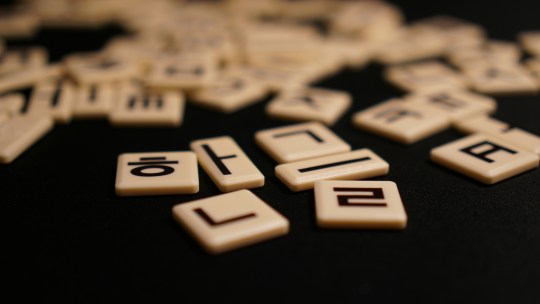
Korean Language:
Korean, the official language of South Korea and North Korea, is a language deeply rooted in history and tradition. The Korean writing system, known as Hangul, is renowned for its scientific design and simplicity.
Hangul consists of 14 consonants and 10 vowels, forming syllabic blocks that are arranged linearly. This unique writing system has played a significant role in preserving the Korean language and fostering a sense of national identity. The Korean language reflects the Confucian values and hierarchical structure of Korean society. Honorifics, known as "jondaetmal,"(honorific words for the elder) are an integral part of the language, used to show respect and maintain social harmony. The use of honorifics varies depending on the age, social status, and relationship between individuals.
Additionally, the Korean language is rich in onomatopoeic words, which vividly depict sounds and actions.
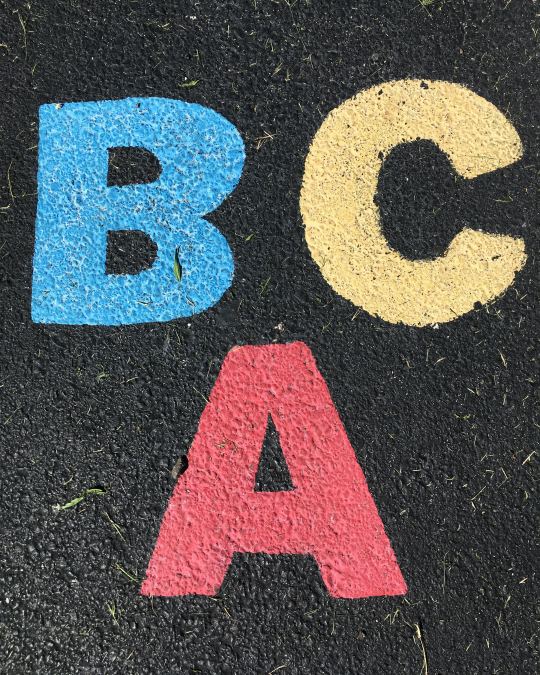
II. English Language:
The English language has evolved over centuries, influenced by various cultures and languages. From Old English to Middle English and Modern English, the language has undergone significant transformations, absorbing words and expressions from different regions and civilizations. English is known for its flexibility and adaptability, the language of business, science, and international communication.
English grammar, although complex, provides a framework for clear and concise expression.

III. Japanese Language:
The Japanese writing system consists of three scripts: Kanji, Hiragana, and Katakana.
Kanji, borrowed from Chinese characters, represents the meaning of words, while Hiragana and Katakana are phonetic scripts used for grammatical purposes and foreign words, respectively. The Japanese language is characterized by its politeness and respectfulness. Honorifics, known as "keigo," are an essential part of Japanese communication.
Additionally, the Japanese language is rich in expressions and idioms that reflect the country's unique cultural values, such as "omotenashi" (hospitality) and "wabi-sabi" (appreciation of imperfection).

IV. The Chinese Language:
A Treasure Trove of Characters and Tones The Chinese language, with its intricate writing system and tonal nature, is a linguistic marvel that has evolved over thousands of years.
Chinese characters, known as Hanzi, are pictographic symbols that represent words or concepts. Especially, Mandarin Chinese, the most widely spoken dialect, has four tones and a neutral tone. The tone of a word can completely change its meaning, adding an extra layer of complexity to the language. For example, the word "ma" can mean "mother," "hemp," "horse," or "scold" depending on the tone used. The Chinese language has gained global prominence due to China's economic growth and influence. Mandarin Chinese is now one of the most widely learned languages in the world, with millions of people studying it as a second language.
0 notes
Text
𝕔𝕙𝕚𝕟𝕖𝕤𝕖 𝕝𝕖𝕒𝕣𝕟𝕚𝕟𝕘 𝕣𝕖𝕤𝕠𝕦𝕣𝕔𝕖𝕤
here is a list of some really helpful mandarin resources that i found recently! all of the underlined ones are live links :)

chinese-grammar: i’m gonna be honest here, this grammar website is IMPRESSIVE. it provides 22 lessons and an extensive and detailed explanation of chinese script and characters (with a really long list of characters). i only just recently came across this website but i totally see myself using this, like, all the time. i highly highly highly recommend it!
chineseboost : this website is definitely an awesome long-term resource! it provides lessons for pretty much all levels of chinese (a1-c1, hsk1-hsk5) so everything is in one place! it also has some super helpful tools such as as a hanzi to pinyin translator and a blog where they have tips and study strategies!
LTL mandarin school : although the posts on this blog are a little limited, i feel like the posts that they do have are pretty helpful, especially their “complete guides” to basic chinese grammar! this is definitely not a primary resource, but since it has some helpful stuff i decided to include it :)
HSK 1: i find myself coming back again and again to this app! it’s a super super accessible resources and really interesting as a beginner chinese learner since it kind of throws you in the deep-end with its built-in games, and it’s honestly quite refreshing. it also provides a huuuuge bank of vocabulary as well as sentences!
HSKOnline: this app is most useful to people who plan to take the hsk exams. i believe it provides all 5 hsk levels with practice exams, exercises, and important vocabulary! i personally have not completely dived into this app since i am very much not exam ready haha, but i can see how it would be very very helpful for people who want to formalize language learning. (honestly it’s great for casual language learners as well since you can just pretend that they are practice tests or fake tests)
Infinite Chinese: this app is great if you are a beginner and you want a fun and interactive way to dive into the language! it’s also a great warmup activity. infinite chinese is basically an app that has a game very similar to quizlet’s meteor game thing (i hope you know what i mean) and it also covers quite a lot of vocabulary. it’s great for review as well! :) i’ve used this app multiple times for entertainment too, so it really helps you pick the language up a little faster!
pleco chinese dictionary : needless to say, it’s super important to have a mandarin dictionary since the vocabulary and script is so expansive. i feel like this dictionary is particularly awesome since there is handwriting input (you can write out a character using your own hand) that will give you the definition and pinyin of whatever you wrote! this is great since it’s sometimes easy to mix up definitions and pronunciations since the language is so nuanced. ans, because it’s an app, it’s nice and accessible and not to mention portable lol
scripts: this app has been something i find myself coming back to over and over again for not only mandarin, but other languages as well! for mandarin specifically, it gives you a really strong foundation on chinese radicals (if you are new to the language: radicals are the fundamental and most basic strokes that makes up the mandarin script- it’s super important to learn them because it will help you write and also sometimes help you with the definition of words you may not know quite yet) which is super helpful, especially in the long run.
lingodeer: honestly speaking, lingodeer is a great app to learn mandarin! even though it somewhat forces you to go through all the basics before jumping into the meat (but that’s pretty much every language learning app so i’m not surprised about it), it provides a good review of things you already learned and does it pretty thoroughly. a lot better than duolingo
#chinese#china#Chinois#Mandarin Chinese#Chinese language#chinese langblr#language#languages#ctrl alt languages#ctrl-alt-aesthetic#ctrl-alt-languages#ctrl-alt-langauges#ctrl alt aesthetic#japanese language#french language#language blog#studyblr#langblr#language blr#Korean langblr#french langblr#study blog#inspo#POLYGLOT#polyglots#studyspo#language inspo
991 notes
·
View notes
Text
I’m trying to learn other languages too so I’m wondering if I should create side blogs, or just keep it all in the same blog (with tags of course)
#korean#korean study blog#한국어#study blog#study motivation#korea#learning korean#text post#my post#learning languages#language study#study korean#study chinese#study japanese#langauges#langblr#language#languages#language learning#korean language#learn korean language#korean studyblr#language tips#foreign languages#learn korean#korean learning#learn chinese#learnblr#studyblr#languageblr
11 notes
·
View notes
Text
New Year Resolutions in Korean!
안녕! I haven't posted in a while due to work, but! Don't fret! I have a new post for you all about the New Year in Korean! Let's get started! 가자!
Vocabulary to know:
새해 복 많이 받으세요! - Happy New Year!
새해 다짐 - New Year's Resolution
How do we form the sentence in order to say our New Year's Resolution? It's super simple! I'll show you!
제 새해 다짐은 [verb stem]는 거예요/거야.
Let's break the sentence down so we can see it more in detail:
•제 means my in formal language. If you don't know whether or not to be informal or formal, I'd be safe and say use formalities.
•새해 다짐 say we see means New Year's Resolution.
•은 is our topic marker, saying that our topic is my new year's resolution.
•The [verb stem] is whatever you want to work on this upcoming year!
•는 is used as a topic marker. (Please note that you use 는 if the verb stem ends in a vowel, if it doesn't, use 은).
•거예요/거야 is future tense. It shows that it will happen, it just hasn't yet. 거야 is the shorter, informal version of 거예요, but always start out using formalities unless you know for sure that you can use informalities.
Side note: you can put an object before the noun to be more specific on what your goal is. You'll see that in the sentences below!
Examples of New Year's Resolutions:
제 새해 다짐은 매일 운동하는 거예요. My new year's resolution is to exercise everyday.
제 새해 다짐은 책을 200개 읽는 거예요. My new year's resolution is to read 200 books.
제 새해 다짐은 중국어를 더 공부하는 거예요. My new year's resolution is to study Chinese more. (One I really need this upcoming decade!)
제 새해 다짐은 매일 자정 전에 자는 거예요. My new year's resolution is to sleep everyday before midnight.
제 새해 다짐은 없슴니다. I don't have a new year's resolution. (Sometimes we don't and that's okay).
What are some of everyone's new year goals? Do you all have any big plans for the new decade? I hope everyone had a good 2019, so here's to a new era! 새해 복 많이 받으세요! See you all soon! 안녕!
#safsstudy#safslangblr#korean vocabulary#korean grammar#korean language#korean#korean lang blog#korean langblr#korean studyblr#korean study blog#한국어 공부하기#한국말#한국#한국어#한국어공부#한국어배우기#새해#새해 다짐#새해 복 많이 받으세요#langauge#language learning#langblr#langblog#studyblr#studyblog#new year resolutions#koreanstudynetwork
97 notes
·
View notes
Text
Introduction!
Hi! I'm Asi and I love langauges! I'm billingual. My first langauge is Hindi and second is (of course) English.
Currently, I'm learning Urdu and German. Some of you might know that Urdu and Hindi are about 95% similar and basically mutually intelligible but written in different scripts. I already understand colloquial Urdu, I'm just trying to learn the script because I want to learn Persian (or Farsi) as well so this seemed like a good starting point. German just seems like a really great langauge to me (plus I want to study there in the future!) so it seeming like a good langauge to learn. I'm really enjoying it :)
I've always loved learning about langauges. I have watched the YouTube video, Thoth's Pill- An Animated History of Writing by NativLang several times. If you haven't seen it, I advice you to check it out! It's amazing! I also enjoy learning different scripts, so there's that.
I've created this blog because I want to document my langauge learning journey and make new friends in this community as well :)
#deutsch langblr#langblr#love langauges#langauge learning#language#billingual#deutsch#hindi#urdu#korean#farsi#persian#russian#italian#new blog#bilingual
8 notes
·
View notes
Text
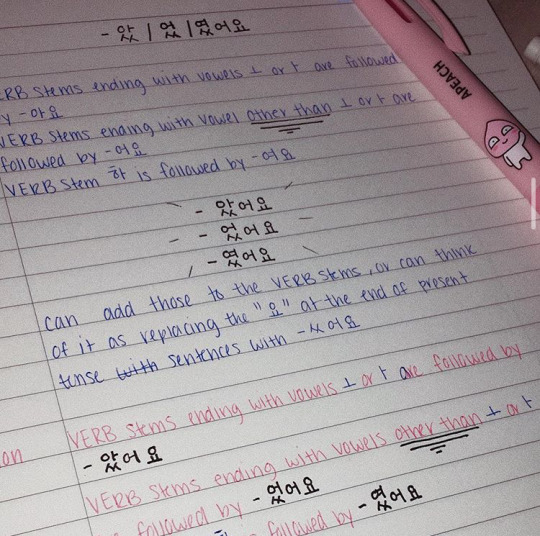
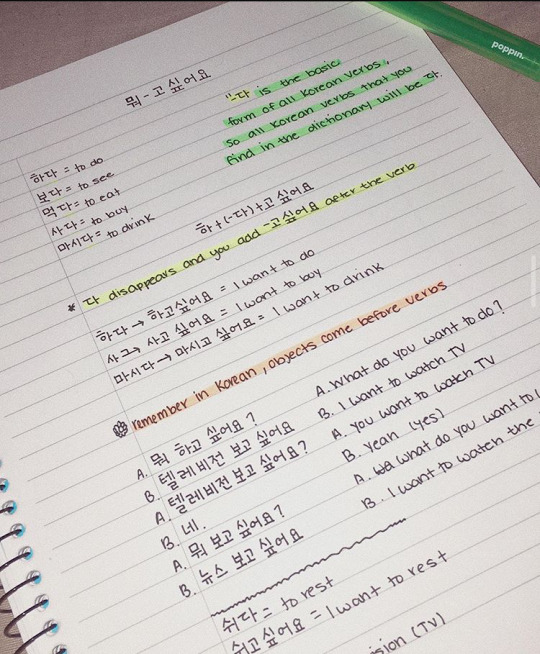
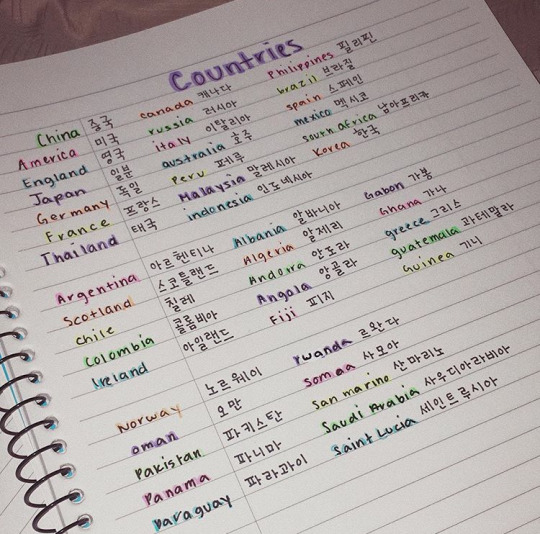
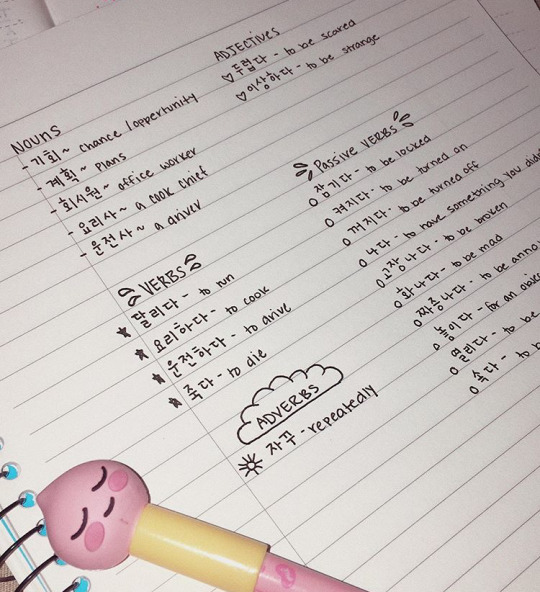
안녕하세요 여러분들 제 이름은 클라리사 이고요 한국어를 3년 공부했어요 하지만 한국어로 말할 때 아직 실수를 많이 해요 그래서 실수 했다면 죄송합니다
Hello everyone ! My name is klarissa and I’ve been learning korea 3 years now but when speaking in korean I still make a lot of mistakes so I am sorry if I make mistakes ~
#south korea#korean language#korean langblr#korean study blog#langauge#language study#한국어공부#한국어 공부하기#한국어 연습#한국어 배우기
22 notes
·
View notes
Text
Korean in Real Life: 역시
역시 is a word that I’ve spent a lot of time trying to work out its exact meaning. Before I moved to Korea I remember asking some of my Korean friends what it means and they had a very difficult time giving a particular definition for it. And now that I live here, and I listen to the language being spoken everyday, I understand the context of when it can be used. However a definition still eludes…
View On WordPress
#Blogger#Culture#Korean#Korean Culture#Korean Langauge#Learning Korean#Live Abroad#Living abroad#Study Korean#Teaching abroad#Travel#Travel Blog
1 note
·
View note
Photo
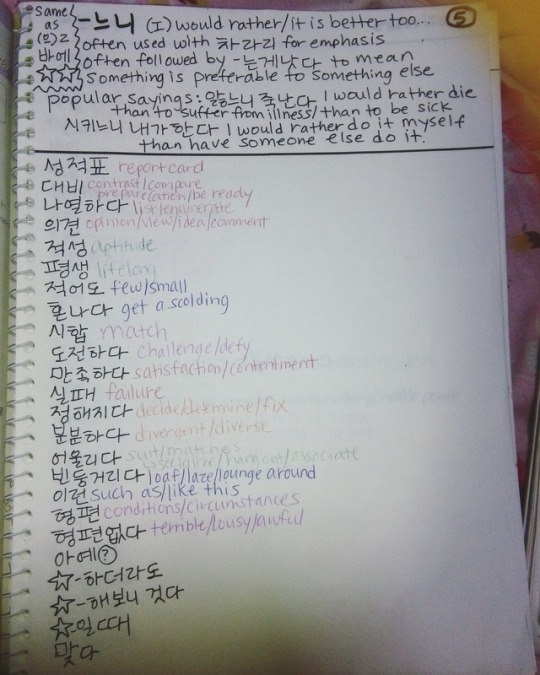
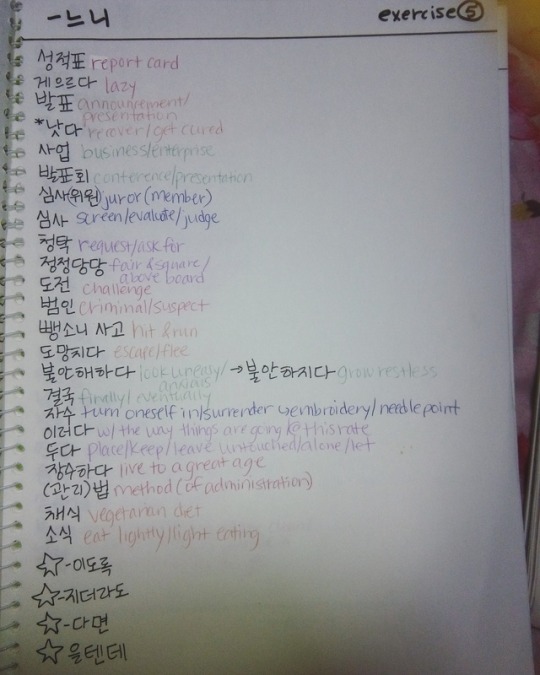
Lesson 5 from the book I am studying, the green/advanced 빈도별 토픽. It covers the grammar -느니 and means “I would prefer/It is better to..” It is often used with 차라리 for emphasis and is often followed by -는게낫다 which means something is preferable to something else
Some popular phrases using this grammar include “앓느니 죽난디” and “시��느니 내가 한다.”
I will create two sentences with this grammar and have them checked then put them here tomorrow.
#느니#느니 grammar#빈도별 토픽#토픽#TOPIK test#Korean langauge test#Korean TOPIK test#Korean TOPIK#Korean grammar#Korean vocabulary#korean vocab#learn korean#study korean#korean language blog#korean langauge#korean#study hangul#learn hangul#study hangeul#learn hangeul#TOPIK
49 notes
·
View notes
Text
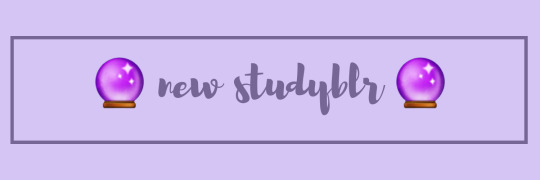
🔮 hey my name is ari!
🔮 i'm currently an upper 6 student in trinidad writing cape.
🔮 im a langauge student; i take french, spanish and environmental science [communication studies and caribbean studies are compulsory]
🔮 i'm going to study linguistics at university [i really wanna focus on sociolinguistics and creole dialectology]
🔮 native language: english, trinidad english creole
🔮 currently learning: french [b2], spanish [b2]
🔮 have been learning off and on/want to learn: portugese, mandarin, korean, patois
🔮 some of my other interests include: trying to learn more languages than i can manage, drinking copious amounts of tea, studying astrology, tarot and oracle decks, reading until ungodly hours of the morning, listening to music [i love soca, reggae, kpop, post hardcore/emo bands, dancehall, reggaeton and a few french artists], calligraphy and brush lettering
🔮 she/her | intp-t | 6w5 | cancer sun, scorpio moon aquarius rising | still can't tell if i'm more ravenclaw or slytherin
🔮 this is actually not my first studyblr. i switched accs two years ago but stopped using tumblr but i'm back now!
🔮 i hope to use this blog frequently to connect with my friends in the community [plus make some new ones as well], inspire others esp young caribbean students [i know there aren't many resources out there so i'm here to help] and just to record my progress and keep myself inspired as i move from secondary school to university [as soon as i decide where im going i'll let y'all know!]
🔮 this blog is solely aimed at spreading positivity however i may speak on social issues from time to time
🔮 that being said: this blog is a safe space! you are free to disagree with me or anything i reblog but any offensive posts or users will be removed [i.e. no racism, homophobia, transphobia, fat-shaming, classism, sexism, etc.]
🔮 please send me a msg or leave an ask if there's anything you need!
🔮 some people that inspire me:
@multilingual-wannabe // @eirlon
@studyign
@academla
@academiix
@obsidianstudy
@universi-tea
my other close friends who arent on tumblr :(
🔮 my main is @imaginari
ari ♡
#new studyblr#small studyblr#studyblr#langblr#lingblr#cxc cape#trinidad and tobago#trini studyblr#caribbean studyblr#french#spanish#astrology#music#reading#environmental science#communication studies#caribbean studies#sixth form#modern languages#university#productivity#rien es studyin#lingually#oc#heysareena#academiix#arilookatthis#studyblr intro post#ariwrotethis#cxc csec
33 notes
·
View notes
Note
What is the difference between -게 하다 and -게 되다?
Great question! First, we need to understand that 하다 is active whereas 되다 is passive! Your next question might be, “but omg, SK101, I’m not good at English grammar, too; what the hell is passive and active?”
Another great question!
The active voice is when the speaker/subject performs the action or is described directly–they did it, caused it, performed it; you’re gonna see people commonly use these ways to explain the active voice. In English, the active voice can look something like this:
I studied Korean; (저는) 한국어를 공부했어요
As you can see, I (the subject) am the one that studied Korean of my own volition. I caused the “Korean studying.”
The passive voice is when the speaker/subject does not perform/cause/do the action. Instead, the subject is affected by the action/performance. I understand this may be difficult to understand, so I’ll spend more time on this.
When can you use the passive voice?
When we have more interest in the object that experiences the action
When we don’t know (or don’t want to express) who performed the action (this is an academic loophole when we didn't do the proper research to support a claim)
When we want to emphasize the action!
The passive voice is not grammatically incorrect (take it from a linguist and someone who minored in creative writing). You will hear people say that the passive voice is not good or is ungrammatical (some bs like that). Even in Korean, the passive voice is entirely natural and used in everyday contexts.
The passive voice in Korean may look like this:
한국어가 (저에게) 공부됐어요; Korean was studied (by me)
The prepositional phrase “by me; 저에게” shows that we know who studied Korean. This may still be confusing, so let me give you another example:
부엌을 청소했어요; I cleaned the kitchen.
부엌이 청소됐어요; The kitchen has been cleaned.
Let’s add more context to the sentence to understand the situation better.
집에 도착했을 때 부엌을 청소했어요; When I got home, I cleaned the kitchen (meaning, I saw the dirty kitchen and cleaned it)
집에 도착했을 때 부엌이 청소됐어요; When I got home, the kitchen was cleaned (meaning, someone (unknown or otherwise) cleaned the kitchen when I was out)
*gasp!* Yes, by now, you've noticed that 이/가 goes with passive!
Now, onto your question: what's the difference between -게 하다 and -게 되다?
-게 하다: causative
The causative aspect shows that A causes B to happen. Pretend you have a younger sibling–here are some examples:
동생은 저를 늦게 했어요; My sibling made me late
저는 동생이 문제를 이해하게 했어요; I made them understand the problem
저를 귀찮게 했어요; You (the sibling) bothered me!
(저는) 동생을 화장품으로 예쁘게 했어요; I made my sibling pretty with makeup
A (동생/저) causes B to happen. B does not mean the recipient (저/동생) of the action – B represents the action.
-게 되다; to become (passive)
This grammar point shows that B changes A! Let’s use the examples from above.
동생이 화장품으로 예쁘게 됐어요; my sibling became pretty with makeup
동생 때문에 제가 귀찮게 되었어요; my sibling has been bothering me
문제가 동생에게 이해하게 되었어요; my sibling came to understand the problem [more literally; the problem was understood by my sibling]
동생 때문에 제가 늦게 되었어요; I became late because of my sibling
Now, I'm sure you've noticed that there are two spellings of a conjugated '되다'. The only difference between '되었어요' and '됐어요' is that '됐어요' is a contraction of '되었어요'. You may have other Korean learners attempt to tell you that you write one [되었어요] and speak the other [됐어요]. This isn't not true; it's just not a rule written in stone. You are very much able to write the contracted '됐어요' instead of the regular '되었어요'. In fact, native Korean speakers do this all the time. It would be like saying we shouldn't write any English contractions because it's not grammatically correct--it's just wrong. The rules of '되다' are more complex than just written and spoken, but that's a blog for another day.
I hope this helped answer your question! If you're still confused, don't hesitate to send me another ask or pm me! I'm always open to clearing up any confusion or directing you to a source that may help!
Happy Learning :)
~ SK101
#korean blog#korean#korean language#learn korean#study korean#korean langblr#한국어#한국어 배우기#korean language blog#langblr#kblr#korean langauge#south korean#한국어 공부하기#한국어 문법#한국어공부#korean words#studyblr#-게 되다하고 -게 하다 차이#한국어 동사#문법#ask#물어보기 아논#물어보는 질문#질문#한국어 질문
197 notes
·
View notes
Note
wait you speak seven /7/ languages???? ???? i might have scrolled tooo much on your blog and i saw you answered an ask... do you maybe speak korean? hope it isnt personal since you didnt want to elaborate on exact languages you speak.. i loveyour stories a lot and you became even more interesting omg HOW did you learn them?? im studying japanese and korean but its so hard!! love you!! also you dont need to answer this if you dont want too
Hi! ❤ oh >.< I dont talk about it because this blog is just for writing/kpop entertainment - I dont think people care enough about who I am, and many are fast to think I brag, etc so I just dont do it ^^
Anyways, THIS MIGHT BE LONG so watch out! Read only if you are interested about my TED talk on learning Korean (and other languages) haha 😊
I do speak Korean! I write my research papers in Korean after all so... I guess I can state that. As for the rest... well I was born into a bilingual family! And Im from a small country that is overlooked by literally everyone (I barely ever met people who know my country) so learning “the big” languages like English/German is a must - I learned both since I was very young and during my young days not much was dubbed into my native language so I had to watch it in a language of another country... If you speak English and German, you can learn quickly Norwegian - I did that with the help of my Norwegian friend!
As for Korean - its difficult when you first start, but I learned Korean within two years - Im now advanced. I have to say I was lucky since I already spoke many languages and I can refer to all of them if I dont get something in Korean! Otherwise its just your determination. Also, do NOT study for the sake of language exams (TOPIK) - unless its the only thing you need. I never did that, topik is only a paper to prove something to the administration. Unfortunately, if you want do masters/doctoral studies in Korea, you need to study other, more advanced/difficult texts than is topik.
Plus, use LingoDeer - its the best app for Asian langauges that explains sentence structure as it is in Korean, NOT the way English is structured. English has very little in common with Korean, it would be of no help to you. I dont know much about Japanese, I only understand some words thanks to Korean. But my Japanese friends were able to learn Korean fairly easily given their grammar/syntax is similar :) Frankly, only a few days ago I started learning hiragana just for fun but I dont think I will study it seriously haha.
Also, last advice - I would not study two languages at a time if you are really serious... But that is purely the way I work. I cant do it now at my age. I know I can learn a language a bit faster, so I make sure I focus on it only, and later when I feel confident, I would start the second language. But once again, that is just my opinion because I know myself >.<
I hope I helped? Good luck with studying and thank you for being interested haha! ❤❤❤❤❤❤
4 notes
·
View notes
Text
《 About Me Tag 》
RULES: answer questions, then tag bloggers you would like to know better.
Tagged by: Thank you @hee-jeong-ssi! (u did my main @kaliente-monster I'd rather do it here)
Name: I'd rather not share my actual name but my nickname is Liana (pronounced Lee-nah) and it's like 2/3 of my real name.
Nickname: Liana is really my only nickname
Zodiac: Cancer
Height: 161 cm (5'3")
Langauges: English and Malagasy are my first languages and I'm learning Spanish at school and also a bit of Korean
Natuonality: American. I wish I was born in Madagascar.
Favorite Season: Summer because I was born in the summer.
Favorite Flower: Peony
Favorite Scent: Either Vanilla or new books
Favotire Color: Black... it goes with everything.
Favorite Animal(s): Cheetah!
Coffee, Tea, or Hot Chocolate: Depends on my mood but I had hot chocolate today
Average Amount of Sleep: ...like 6-8 hours
Dogs or Cats: Cats. I've had two cats and I love them to death.
Number of Blankets: 1 or 2
Dream Trips: I want to take someone to Madagascar, my home
Blog Est: I joined Tumblr on May 3, 2017, but I made this blog at the beginning of June 2020
# Of Followers: 121 (I love you guys)
Random Fact: uhhh idk I got into K-Pop because my brother and I were able to see BTS for free and I said "K-Pop is weird" and we didn't see them and two weeks later I got into BTS
Followera I'd Like To Get To Know Better: @youngjjo @plutolunas @joong-littlelove @weuschoiceheart @defaura and anyone else! 💕
7 notes
·
View notes
Text
basic japanese sentence structures
here is some basic information on japanese verb conjugation and sentence structures!

japanese verb conjugations by tense:
present positive: ROOT + ます
present negative: ROOT + ません
present questioning: ROOT + ますか
past positive: ROOT + ました
past negative: ROOT + ませんでした
sentence particles:
は: topic particle; used to indicate the subject of a sentence
へ: direction particle: used to indicate a place, direction, or destination
を: object particle: Used to indicate the object of a sentence, NOT Subject
の: possessive particle: Used to indicate possession, acts as an “ ‘s”
basic japanese grammar structure and comparing it to english:
the japanese language follows an SOV sentence structure, which means that the subject comes first, an object comes second, and a verb comes last in a sentence. this is different from english, which follows an SVO structure, where the subject comes first, the verb comes second, and the object comes last. here is an example:
私はアメリカ人です。(わたしはアメリカじんです)
[subject] + [particle] + [adjective] + [object] + [verb]
literally: [I] + [subject indicator] + [america person] + [am]
VS…
i am american.
[subject] + [verb] + [adjective] + [object]
#Japan#japanese#japanese language#japanese langblr#ctrl-alt-languages#ctrl alt languages#ctrl-alt-langauges#ctrl-alt-aesthetic#ctrl alt langauges#language#vocabulary#french language#korean language#language blog#langblr#chinese langblr#studyblr#korean langblr#langbr#japanese lesson#japanese grammar#Korea#korean#south korea#republic of korea#inspo#POLYGLOT#polyglots#studyspo#language inspo
478 notes
·
View notes
Note
Hi! Firstly, I apologize if this is considered a dumb question. What is self study? And how do you do it? Can you tell me the first step I should take to self study Korean?
Not a dumb question at all!
Self study is learning on your own without a teacher or a class (At least for me?)
There are plenty of websites and YouTube channels that are free and absolutely amazing!
When it comes to Korean, I highly recommend learning the writing system (Hangul) before anything else.
Sorry for answering this late! Feel free to ask anything else. I am by no means fluent but I’ll answer the best I can ^^
#korean#korean study blog#한국어#study blog#anon reply#learning languages#language study#study korean#study chinese#study japanese#langauges#langblr#language#languages#language learning#korean language#learn korean language#korean studyblr#korean langblr#language tips#foreign languages#learn korean#korean learning#learn chinese#learnblr#studyblr#languageblr
7 notes
·
View notes